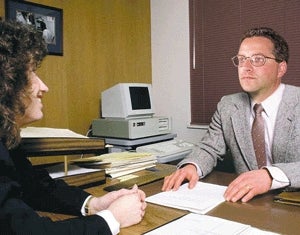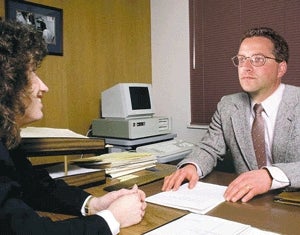DEARBORN, MI–Laid off Monday from his billing-manager position at Automatic Data Processing, Howard Pfaff reported that his exit interview with human-resources associate Lorraine Bochy “went pretty well.”

“After getting the pink slip, I wasn’t exactly looking forward to doing my exit interview,” said Pfaff, 39, who had worked in ADP’s billing-services department for 11 years before budget cuts eliminated his position. “But it actually wasn’t that bad. Lorraine asked me all sorts of questions about my overall job satisfaction during my years with ADP and if there was anything I’d do different if I were the boss. I was afraid maybe she was going to criticize me, but all in all, it was pretty cordial.”
Continued Pfaff: “Lorraine explained that exit interviews are an extremely valuable way for the company to determine what changes need to be made to improve the work environment for future employees. That made pretty good sense to me.”
Also encouraging to the newly unemployed Pfaff was Bochy’s “great regret” that the company had to let him go.
“She said it had nothing to do with my job performance, which, according to my file, rated either ’fair’ or ’good’ for every quarter since I was hired,” said Pfaff, who had never met Bochy prior to the interview. “So that made me feel a little better, I guess.”
Bochy informed Pfaff that the typed list of questions she held was “merely a launching point” and that the two could talk about whatever he wanted.
“I told Lorraine a few things but, to be honest, I didn’t want to be too critical,” Pfaff said. “Sure, there were a lot of things about working at ADP that I hadn’t been too thrilled about, like the lack of inter-departmental communication and the frequent overtime, but I didn’t really know if I should go into it. Especially since I’m still sort of hoping that maybe the budget cuts will be lifted and I’ll get rehired.”
According to Pfaff, the highlight of the exit interview was seeing his permanent employee file for the first time.
“That was kind of neat, to be able to see what’s been in my secret file all these years,” Pfaff said. “They had all this weird stuff in there, like a copy of my medical records. And a picture of me at a 1991 company picnic that must have been clipped out of the monthly newsletter. When I saw that, I was like, ’Huh.’”
Pfaff said he was even more interested in what wasn’t in the file.
“I was afraid there was going to be some kind of mention of that one week last year when I got in late four days in a row because my car was at the mechanic,” he said. “I remember that, at the time, I was really worried I’d get in trouble for that, but I couldn’t find a single mention of it.”
Pfaff said the file was not necessarily an accurate representation of his job performance, asserting that the best things he had done during his years with Automatic Data Processing were not included.
“There was a hand-written complaint in there saying that I’d been disturbing coworkers by playing my radio in my cubicle. That came as a total surprise to me, because no one ever once asked me to turn it down,” Pfaff said. “As for my steady productivity over the years, there really wasn’t any mention. I’d always assumed they kept track of how many accounts each one of us billing managers handled each month. I guess they don’t.”
In the final minutes of the interview, Bochy informed Pfaff that he could count on a good reference from the company, a subject Pfaff had been nervously anticipating.
“Lorraine said, ’I don’t see any reason why you would receive a negative reference from anyone here at Automatic Data Processing. Unless, of course, there’s something I don’t know,’” Pfaff said. “I’m pretty sure that second part was meant to be a joke.”
As Pfaff exited the ADP human-resources office, a smiling Bochy shook his hand and said, “Good luck, Howard.”
“I guess there was nothing to be nervous about,” Pfaff said. “Lorraine was really nice. She even said she hopes that someday in the future, we can work together again.”







